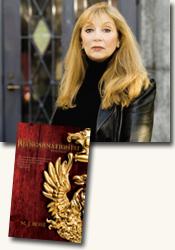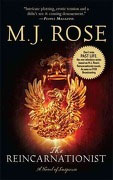author interview
book reviews:
· general fiction
· chick lit/romance
· sci-fi/fantasy
· graphic novels
· nonfiction
· audio books
· author interviews
· children's books @
curledupkids.com
· DVD reviews @
curledupdvd.com
newsletter
win books
buy online
links
home
for authors
& publishiss
for reviewers

|
|||||
 
Marie D. Jones interviewed author M.J. Rose about her novel
The Reincarnationist Interviewer Marie D. Jones: M.J., this is not just one story, but two intertwined stories that move back and forth between past and present. Did you find it a challenge to keep the two plotlines straight? M.J. Rose: Actually there are three, but the book very much unfolded for me moving from the past to the present and then back again. I didn’t find it a challenge to write, but I did when I thought about it. What began your interest in reincarnation and past-life regression? Have you ever experienced glimpses of a past life of your own? This is the book of my heart.
You’ve written a historical thriller that required plenty of research. Do you enjoy the research aspect of writing? When do you know you’ve done enough research and are ready to write? I did enjoy the research but was surprised by much I got caught up in it.
Three months before I start a new novel, I start my main character's scrapbook. The very process of collecting his or her past - preferred poems, swatches of favorite colors, letters, postcards, memorabilia allows me time to find him or her.
Your book explores the Roman church’s denial and subjugation of the concept of reincarnation. Why do you think this subject was so taboo to the motives and beliefs of the early Christian church? Reincarnation has been part of every ancient religion and most modern religions. Obviously Hinduism and Buddhism. But Muslim Sufis believe in it still. And it is major part of the Kabbala – which is the mystical part of Judaism.
You are one of those rare, successful authors who can move between fiction and nonfiction. What turns you on about each? Are there any other types of writing you’d like to attempt? Screenwriting? Plays? I started out writing screenplays and love them. I’ve written about a dozen – two based on my own novels – and had about six of them optioned. For a few years I did a lot of journalism but haven’t been doing much of that since I started a marketing company for writers, AuthorBuzz.com, and once a year (this Jan 08- Feb 08) teach an online marketing class. You wrote two books on marketing. Can you discuss a little bit about how marketing plays such a huge role nowadays for authors? There was a time when all authors had to do was write…that has changed, has it not?t? Sure has. 85% of all books get less than $2000 in marketing dollars from the publisher. At the same time there are 1000 novels published a month, 100,000 books a year. And reviews have shrunk by over 50% and the press is not interested in authors the way they are in every other kind of entertainer/celebrity. In a word, we’re screwed.
May we get a taste of what you are working on next? Novel? Nonfiction? Something else entirely? The next book in the series, The Memorist.I’m doing this series a little differently. There won’t be continuing characters but rather a continuing group of objects. The first book is about the discovery of and adventure around an ancient memory tool that helps people access their past lives. I’ve suggested in this book that there were 12 such memory tools created in ancient India over 5000 years ago. In each books in the series, a different one of those memory tools will surface and the story will flow from there. M.J. Rose International bestselling author M.J. Rose is the author of eight previous novels, including Lip Service and three titles in the Butterfield Institute series: The Halo Effect, The Delilah Complex and The Venus Fix. She's also the co-author of two nonfiction books on marketing. Rose is on the board of directors of the International Thriller Writers and lives in Connecticut. Marie D. Jones is a nonfiction author and contributing reviewer to curledup.com. Her interview with M.J. Rose was written in conjunction with her review of The Reincarnationist. © Marie D. Jones/2007.
|
|||||
| fiction · sf/f · comic books · nonfiction · audio newsletter · free book contest · buy books online review index · links · · authors & publishiss reviewers |
|
| site by ELBO Computing Resources, Inc. | |

